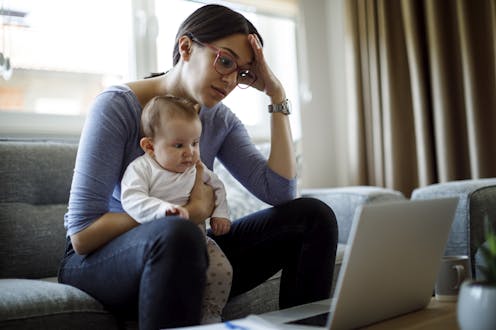What is child care insecurity? 2 social scientists explain
- Written by Cassandra M. Johnson, Assistant Professor of Nutrition and Foods, Texas State University

Child care insecurity is a term we’ve come up with to describe limited or uncertain access[1] to adequate child care.
It factors into many Americans’ decisions[2] whether to even have a child. Parents – mothers especially – often weigh the cost of child care in their decision to return to work. And when a kid has a disability, there may not even be child care options that meet the family’s needs[3].
As researchers who study how policies and systems[4] affect well-being and health[5], we argue that child care insecurity is a public health issue similar to food insecurity[6].
And just as with food insecurity, increasing access is necessary. However, access alone will not address the problem.
Why child care insecurity matters
Female caregivers in the U.S. have traditionally borne most of the burden of finding and managing child care and providing care directly. This results in stalled careers[7], higher stress[8] and lower earnings[9].
When schools and child care facilities were forced to close or restrict access during the COVID-19 pandemic, millions more American[10] parents and guardians – men and women alike – found themselves suddenly facing child care insecurity. This affected their well-being and mental health.
A group of health psychologists surveyed parents[11] throughout the beginning of the COVID-19 pandemic. About 4% of the parents reported having high stress levels “before COVID-19.” But by May 2020, that share had ballooned to 22%.
Meanwhile, sociologists who surveyed and interviewed[12] U.S. mothers in April and May of 2020 found that not having child care affected mothers’ interpersonal interactions – such as increased frustration with their children – and quality of life.
How common is it?
In January 2020, 26 million working caregivers in the U.S. “did not have an in-home care option” – whether a parent, grandparent or older sibling – for children 14 years and younger, according to a Rand Corp. analysis of data[13] from the U.S. Department of Labor.
A World Bank Report[14] from December 2020 estimated that globally, over 40% of all children who needed quality child care or preschool in 2018 did not have access to it. That’s nearly 350 million kids.
[Get the best of The Conversation, every weekend. Sign up for our weekly newsletter[15].]
President Joe Biden has proposed[16] some national policies to address child care insecurity in the U.S. – for example, limiting the percentage of income families need to spend on child care to 7%[17] by providing subsidies to care providers. This would likely improve access.
However, child care insecurity is not always based on economic constraints. The quality of child care, location, hours and access for children with disabilities can all play a role as well.
The Conversation U.S. publishes short, accessible explanations of newsworthy subjects by academics in their areas of expertise.
References
- ^ limited or uncertain access (doi.org)
- ^ Americans’ decisions (www.washingtonpost.com)
- ^ meet the family’s needs (www.americanprogress.org)
- ^ how policies and systems (scholar.google.com)
- ^ affect well-being and health (scholar.google.com)
- ^ food insecurity (theconversation.com)
- ^ stalled careers (hbr.org)
- ^ higher stress (www.cnbc.com)
- ^ lower earnings (www.cnbc.com)
- ^ millions more American (www.brookings.edu)
- ^ surveyed parents (doi.org)
- ^ surveyed and interviewed (osf.io)
- ^ analysis of data (www.rand.org)
- ^ World Bank Report (openknowledge.worldbank.org)
- ^ Sign up for our weekly newsletter (theconversation.com)
- ^ has proposed (www.whitehouse.gov)
- ^ to 7% (theconversation.com)
Read more https://theconversation.com/what-is-child-care-insecurity-2-social-scientists-explain-164366
















